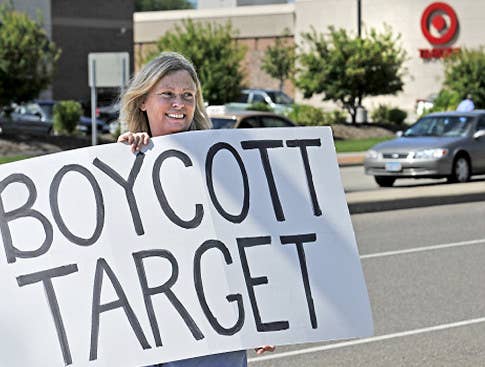
The revelation last week that Joe Ricketts, the founder of TDAmeritrade, was considering spending $10 million on slashing personal attacks against President Barack Obama seemed the latest evidence of the flood of new money entering politics.
Within hours of the New York Times’s scoop of a proposed ad, however, the lesson that emerged was a very different one: How dangerous and embarrassing it can be for corporate figures to play in partisan politics. Ricketts found himself frantically distancing himself from a proposal from adman Fred Davis while he scrambled to insulate his business interests — the brokerage he founded, a hyperlocal New York news group he owns, the Chicago Cubs — from potential fallout from livid liberal customers. It was the highest-profile of a handful of recent squalls revealing some of the natural, political limits to direct corporate influence in electoral politics.
“I shall have no further comment on this or any other election year political issue,” a chastened Ricketts said in a statement Thursday.
Corporate executives have long sought to influence the political process through lobbying expenditures, personal contributions, and occasional large-scale donations. The collapse of the Amercan campaign finance infrastructure over the last half decade has broadened the ability of corporations to give directly to campaigns, and opened the possibility of secret contributions through 501©4 advocacy groups. But SuperPACs like the one Ricketts contemplated, and an array of other vehicles for political money, require the disclosure of contributions; and as donors to Mitt Romney’s SuperPAC have learned this year, attempts to channel anonymous contributions through shell corporations tend to draw intense publis scrutiny.
“I think for a lot of companies that have broad consumer bases and that have spent billions on a brand that people really like, to then go and throw a couple thousand dollars at a political issue is, well, stupid. And so not surprisingly you don’t see many of them doing it,” said Allison Hayward, the vice president of policy at the Center for Competitive Politics, a conservative group that opposes campaign finance regulations. “Big companies that we all think about, that have big consumer bases, and that have spent tons of money trying to create public good will [would risk] throw[ing] that under the bus by trying to get involved in a political campaign.”
Before Ricketts found himself scrambling to protect his business interests from his own contemplated attack ads, the highest-profile recent flap was over the retail giant Target.
In 2010, Target donated $150,000 to MN Forward, a Minnesota-based 527 organization that was backing Republican gubernatorial candidate Tom Emmer, who campaigned against gay marriage. The contribution —conceived as support for a pro-business Republican — became the center of a storm over the emotional, divisive social issue. Under fire, Target’s chief executive penned a public letter bragging of the company’s protection for gay employees, but the campaign against them online petitions, consumer boycotts, and damage to a brand that had positioned itself as the hip, young, and contemporary rival to Wal Mart.
The episode is now viewed in corporate public relations circles as a cautionary tale, and as a victory by gay rights groups.
“Corporations want to be as discrete as possible about political contributions, because they understand how their political contributions can be used against them,” said Fred Sainz, the communications director at the gay rights group Human Rights Campaign. “Believe me, every corporation in America stood up and took notice to what happened to Target.”
While corporations often engage in issues in which their corporate interests are direct and obvious — land-use and tax battles for instance — their adventures in large-scale electoral politics have been less happy. Best Buy, which gave $100,000 to MN Forward, also found itself defending the contribution. A top Romney SuperPAC donor, Frank VanderSloot, became a martyr in the corporate press after his combative conservative record made him a target of the Obama campaign; he complained to Fox News’ Bill O’Reilly that the episode cost his multi-level marketing company, Melaleuca, some 200 customers.
Wealthy individuals without corporate exposure or fragile brands — think of the liberal financier George Soros or the Santorum megadonor Foster Friess — have less to lose. But experts say the prevalence and effectiveness of secret contributions will likely determine the extent of the influence of corporate cash.
“We are seeing a learning curve right now. Much will depend upon whether the laws will allow corporations to keep their contributions secret,” said Rick Hasen, the Chancellor's Professor of Law and Political Science at the University of California, Irvine.
As it stands, both Democrats and Republicans are offering donors secret 501©4 chanels — Priorites USA Action and Crossroads GPS — to influence politics. But those entities face a degree of legal uncertainty and restrictions about media spending around elections that SuperPACs don’t have to contend with — a kind of premium, at least, for secrecy. And the conservative Supreme Court that has struck down campaign finance restrictions seems less concerned about mandatory disclosure of political action.
When conservatives protested making public the names of signatories to a Washington State petition opposing gay marriage, Justice Antonin Scalia wrote:
“There are laws against threats and intimidation; and harsh criticism, short of unlawful action, is a price our people have traditionally been willing to pay for self-governance. Requiring people to stand up in public for their political acts fosters civic courage, without which democracy is doomed.
“For my part, I do not look forward to a society which, thanks to the Supreme Court, campaigns anonymously ... and even exercises the direct democracy of initiative and referendum hidden from public scrutiny and protected from the accountability of criticism. This does not resemble the Home of the Brave.”
CORRECTION: Joe Ricketts is the TDAmeritrade founder who considered giving to an anti-Obama group. Tom Ricketts is his son.

